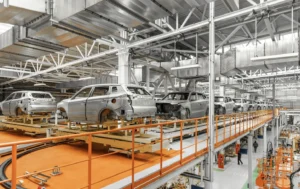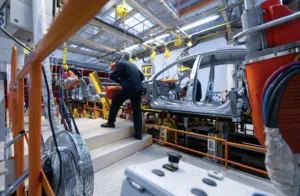The Booming Indian Automotive Manufacturers
The Indian automotive industry stands as a beacon of innovation and economic prowess, playing a pivotal role in the nation’s economic landscape. With its robust growth trajectory and unwavering significance, the sector has become a cornerstone of India’s industrial prowess, contributing significantly to employment, GDP, and technological advancement.
Growth Trajectory of Indian Automotive Manufacturers

Evolution of the automotive manufacturing sector in India
The journey of the Indian automotive industry dates back to the early 20th century when the first indigenous car, the “Hindustan” was produced. Since then, the sector has witnessed a remarkable evolution, transitioning from assembling CKD units to becoming a global manufacturing hub.
Key milestones and achievements
- Introduction of the Maruti 800: One of the most iconic milestones in the Indian automotive industry was the introduction of the Maruti 800 by Maruti Suzuki in the 1980s. This compact and affordable car revolutionized the Indian automobile market, making car ownership accessible to the middle-class population.
- Establishment of Manufacturing Facilities: Indian automotive manufacturers have made significant strides in establishing world-class manufacturing facilities. Companies like Tata Motors, Mahindra & Mahindra, and Maruti Suzuki have invested in state-of-the-art production plants equipped with advanced technology and automation, enhancing efficiency and productivity.
- Adoption of Indigenous Technologies: Indian automotive manufacturers have demonstrated their prowess in innovation by developing indigenous technologies to meet the unique requirements of the Indian market. This includes innovations in fuel efficiency, safety features, and vehicle customization to cater to diverse consumer preferences.
- Global Recognition and Acquisitions: Indian automotive manufacturers have garnered global recognition through strategic acquisitions and collaborations. Tata Motors’ acquisition of Jaguar Land Rover in 2008 catapulted the company into the league of international automotive giants, expanding its product portfolio and market presence.
Current market dynamics and growth projections
Presently, the Indian automotive industry is experiencing robust growth driven by various factors:
- Rising Disposable Incomes: Increasing disposable incomes, coupled with changing lifestyles and aspirations, have led to a surge in demand for automobiles, especially in urban areas.
- Urbanization: Rapid urbanization has fueled the demand for personal mobility solutions, including passenger cars, two-wheelers, and commercial vehicles, to cater to the transportation needs of urban dwellers.
- Government Initiatives: Government initiatives such as “Make in India” and incentives for electric vehicles have boosted investments in the automotive sector, attracting both domestic and foreign players.
- Technological Advancements: Technological advancements, including the adoption of electric vehicles, connected vehicles, and autonomous driving technologies, are reshaping the automotive landscape and driving innovation.
The growth trajectory of the Indian automotive industry presents lucrative opportunities for manufacturers to capitalize on the burgeoning domestic market and expand their presence in international markets.
Major Players in the Indian Automotive Industry
India boasts several prominent automotive manufacturers that have made significant contributions to the industry’s growth. Companies like Tata Motors, Mahindra & Mahindra, and Maruti Suzuki have established themselves as industry leaders, producing a diverse range of vehicles catering to various segments of the market.
In addition to domestic manufacturers, multinational automotive giants have also made substantial investments in India. Companies such as Hyundai, Honda, Toyota, and Volkswagen have established manufacturing facilities and distribution networks in the country, leveraging India’s skilled workforce and growing market potential.
Indian automotive manufacturers offer a wide array of vehicles, including passenger cars, commercial vehicles, two-wheelers, and three-wheelers. These companies have diversified product portfolios catering to different consumer preferences and market segments. While Maruti Suzuki leads the passenger car segment with a significant market share, Tata Motors and Mahindra & Mahindra dominate the commercial vehicle and SUV segments, respectively.
Factors Driving Growth in the Indian Automotive Sector
1.Increasing demand for automobiles in India
India’s burgeoning population, rising disposable incomes, and urbanization have led to a surge in demand for automobiles. The growing middle-class population and aspirations for mobility have fueled sales across various vehicle segments, driving the sector’s growth.
2. Technological advancements and innovation in the automotive industry
Technological innovation is reshaping the automotive industry, with advancements in areas such as electric vehicles (EVs), autonomous driving, connectivity, and shared mobility. Indian automotive manufacturers are embracing these trends and investing in R&D to develop cutting-edge technologies and sustainable mobility solutions.
3. Government policies and initiatives supporting the automotive sector
The Indian government has implemented several policies and initiatives to support the automotive sector’s growth, including incentives for electric vehicles, promoting domestic manufacturing through schemes like “Make in India,” and improving infrastructure and regulatory frameworks. These initiatives have created a conducive environment for investment and innovation in the automotive industry.
Challenges and Opportunities
Challenges faced by Indian automotive manufacturers
Indian automotive manufacturers encounter various challenges, including fierce competition, fluctuating raw material prices, regulatory compliance costs, and supply chain disruptions. Additionally, technological disruptions and changing consumer preferences pose challenges for traditional automotive business models.
Emerging opportunities in the Indian automotive market
Despite challenges, the Indian automotive market offers significant opportunities for growth and innovation. Rapid urbanization, infrastructure development, and government initiatives promoting electric vehicles and clean mobility present opportunities for manufacturers to diversify their product offerings and tap into new market segments.
Strategies for overcoming challenges and capitalizing on opportunities
To overcome challenges and capitalize on opportunities, Indian automotive manufacturers can focus on enhancing operational efficiency, investing in R&D for product innovation, leveraging digital technologies for process optimization, and strengthening partnerships across the value chain. Embracing sustainability practices, fostering a culture of innovation, and adopting agile business strategies will be key to navigating the evolving automotive landscape.
Sustainable Practices and Future Trends
Adoption of sustainable manufacturing practices in the automotive industry
Indian automotive manufacturers are increasingly adopting sustainable manufacturing practices to reduce environmental impact and enhance operational efficiency. This includes initiatives such as waste reduction, energy efficiency improvements, water conservation, and adoption of renewable energy sources in manufacturing processes.
Future trends shaping the Indian automotive sector
The Indian automotive sector is witnessing several transformative trends, including the rise of electric vehicles (EVs), connected and autonomous vehicles, shared mobility solutions, and digitalization of automotive services. These trends are reshaping the industry landscape and driving the need for innovation, collaboration, and agility among manufacturers.
Role of electric vehicles (EVs) and other emerging technologies
Electric vehicles (EVs) are poised to play a significant role in India’s automotive future, driven by factors such as government incentives, environmental regulations, and growing consumer awareness. Indian automotive manufacturers are investing in EV technology development and infrastructure to capitalize on this emerging market opportunity. Additionally, other emerging technologies such as artificial intelligence (AI), blockchain, and advanced materials are also expected to impact the automotive sector, driving innovation and efficiency improvements.

Globalization and Expansion Strategies
Indian automotive manufacturers’ expansion into international markets
Indian automotive manufacturers are increasingly looking beyond domestic borders to expand their presence in international markets. Companies like Tata Motors, Mahindra & Mahindra, and Bajaj Auto have established manufacturing facilities, distribution networks, and strategic partnerships in key markets across the globe, including Southeast Asia, Africa, and Latin America.
Strategic partnerships and collaborations with global players
Collaborations with global automotive players have become a strategic imperative for Indian manufacturers to access new technologies, markets, and resources. Partnerships range from joint ventures for technology transfer and product development to strategic alliances for market access and distribution. These collaborations enable Indian manufacturers to enhance their competitiveness, expand their product portfolios, and strengthen their global footprint.
Implications for India’s position in the global automotive industry
India’s expansion into international markets has significant implications for the global automotive industry. As Indian manufacturers gain traction in overseas markets, they contribute to diversifying the global supply chain, increasing competition, and driving innovation. Additionally, India’s emergence as a manufacturing hub for automotive components and vehicles reinforces its position as a key player in the global automotive ecosystem.
Case Studies
- Tata Motors’ Acquisition of Jaguar Land Rover (JLR):
Tata Motors’ acquisition of Jaguar Land Rover in 2008 marked a significant milestone in the Indian automotive industry. Despite initial skepticism, Tata Motors successfully acquired the luxury British brands and transformed them into profitable entities. Under Tata’s ownership, Jaguar Land Rover witnessed a resurgence, with innovative product launches, expanded global presence, and improved financial performance. This acquisition catapulted Tata Motors onto the global stage as a reputable player in the luxury automotive segment.
- Mahindra & Mahindra’s Partnership with Ford Motor Company:
Mahindra & Mahindra’s collaboration with Ford Motor Company exemplifies successful international partnerships in the automotive industry. The strategic alliance between the two companies, announced in 2019, aimed to leverage their respective strengths to develop new products, technologies, and distribution channels. This partnership not only enhanced Mahindra’s global footprint but also provided Ford with access to the Indian market and opportunities for joint product development. By pooling resources and expertise, both companies have strengthened their competitive position and expanded their presence in key markets.
- Bajaj Auto’s Collaboration with KTM for Motorcycle Production:
Bajaj Auto’s collaboration with KTM, a leading European motorcycle manufacturer, has been instrumental in the Indian company’s success in the premium motorcycle segment. The partnership, initiated in 2007, involved joint development and production of motorcycles under the KTM and Husqvarna brands. Bajaj Auto’s manufacturing expertise and KTM’s technology prowess synergized to create high-performance motorcycles that catered to the aspirations of enthusiasts worldwide. This collaboration not only bolstered Bajaj Auto’s product portfolio but also enhanced its reputation as a global player in the motorcycle industry.
These success stories underscore Indian automotive manufacturers’ ability to compete and thrive on the global stage. Through strategic acquisitions, partnerships, and collaborations, Indian companies have demonstrated their capability to innovate, adapt, and succeed in diverse markets, reaffirming India’s position as a formidable player in the global automotive industry.
Conclusion
The Indian automotive industry’s globalization and expansion strategies have propelled Indian manufacturers onto the global stage, driving growth, innovation, and competitiveness.
Indian automotive manufacturers are poised for continued success and expansion in international markets, fueled by their competitive advantages, strategic partnerships, and commitment to innovation.
Are you an ambitious entrepreneur looking to tap into the booming automotive industry in India? Avenue Consumer Brands is here to guide you every step of the way. Our expertise in the Indian market, coupled with strategic insights and a robust network, can facilitate a seamless entry into the automotive sector. From market analysis and regulatory compliance to partner identification and distribution strategies, we provide comprehensive support tailored to your business needs. Let us be your trusted partner in realizing your vision of success in India’s dynamic automotive landscape. Contact us today to explore how Avenue Consumer Brands can help you establish and grow your automotive business in India.
